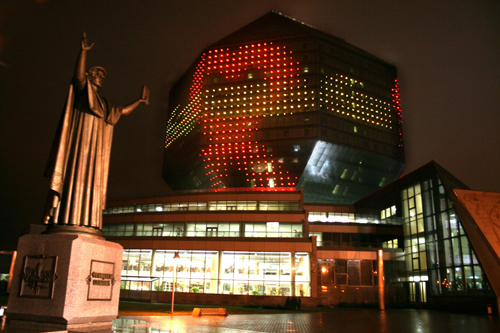
In the Republic of Belarus, HIV-service organizations work in a climate of homophobia and the stigmatization of representatives of the LGBT community. Due to the fact that there are no registered LGBT organizations in the country, HIV-service NGOs represent the interests of the LGBT community in the Country Coordinating Mechanism (CCM).
HIV-service organizations participated in the development of a Terms of Reference for representatives of NGOs in the CCM and for the election of CCM members. The Association, “Belarusian Anti-AIDS Network”, suggested using a public contracts mechanism for HIV-services.
Services for MSM are funded exclusively through grants from the Global Fund to Fight AIDS, Tuberculosis and Malaria.
In order to attract attention to the activity of NGOs working with MSM and other key populations, “Belarusian Anti-AIDS Network” organized and held an NGO Forum, which acted as a platform for dialogue with governmental structures and between NGOs.
Provisions for funding HIV prevention services for MSM were included in the National Program, thanks to the active recommendations of HIV-service organizations and to their partnership with the Ministry of Health. Following the (re)election of CCM members, a number of representatives of HIV-service organizations, representing the interests of key populations, including MSM, became CCM members.
The activity of NGOs to ensure the inclusion of services for MSM in the National Program was possible thanks to support from the Global Fund and the Ministry of Health of the Republic of Belarus, as well as to the cooperation of HIV-service organizations with LGBT activists.
A key barrier to this work is the high level of stigma towards LGBT people.
The NGO Forum can serve as a platform for building partnerships and cooperation between NGOs and government sector institutions in order to advocate for HIV services for MSM.
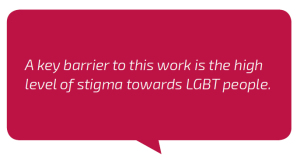
Introduction: Context and Problem
According to UNAIDS, the number of MSM in the Republic of Belarus is approximately 60,000 people (AIDSinfo, 2015). However, according to LGBT activists, this assessment was not conducted correctly, and the actual number is higher. HIV prevalence among MSM was around 4.5% in 2014 [1].
Consensual sexual relations between adult men was decriminalized in Belarus in 1994. Currently, there is no reference to sexual orientation or gender identity in the laws of Belarus as grounds, upon which discrimination is prohibited. At the same time, there remains a high level of stigma and discrimination towards this community among the general population.
According to human rights activists, state bodies of the Republic of Belarus do not do anything to help officials, law enforcement agencies, and the general population to form a tolerant attitude towards LGBT people. As a result, the LGBT community remains largely hidden [2].
In Belarus, only officially registered organizations have the right to implement their own activities. There are no registered LGBT organizations in Belarus. As a result, activists, whose sphere of work concerns the protection of LGBT rights, are often threatened with criminal prosecution, as they are carrying out activities for and on behalf of organizations not registered by the state [3].
Due to this and other similar reasons, it is difficult for MSM to participate in the development and discussion of strategic documents and programs, and to take part in the country dialogue process and in the work of the CCM.
HIV-service organizations provide HIV prevention services for MSM under the Global Fund grant. Previously, several initiatives on human rights protections were carried out in Belarus, but the leaders of these projects were forced to leave the country. As a result, only one organization “Vstrecha” remains, and now carries out HIV prevention work, but no longer deals with human rights issues. The inclusion of the subject of human rights as one of the Global Fund’s priorities will allow for the reconsideration of the issue of the protection of LGBT rights, which is directly related to the effectiveness of HIV prevention programs among gay men and other MSM.
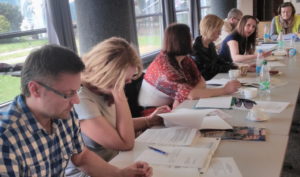
General Case Description: Who Did What?
Currently, the Ministry of Health and the Republican Center for the Prevention and Control of AIDS act as key partners and support the inclusion of MSM in programs to combat the HIV epidemic in the Republic of Belarus.
The Country Coordinating Mechanism of the Republic of Belarus was established in 2012. Representatives of governmental structures and international and non-governmental organizations participate in its work. The work of the CCM is aimed at uniting the efforts of participants in the development and drafting of applications to the Global Fund, ensuring the transparency of this process, and at monitoring the future implementation of grants.
In accordance with Global Fund policies, no less than 40% of CCM members must be civil society representatives, including men who have sex with men (MSM), transgender people, sex workers (SR), and injecting drug users (IDU). The formation of the CCM is carried out according to existing mechanisms (“Regulations on the CCM”, procedures for holding elections, and the “Terms of Reference for Representatives of the Non-Governmental Sector in the CCM”).
The “Terms of Reference for Representatives of the Non-Governmental Sector in the CCM” was developed with the active participation of non-governmental organizations. It includes provisions about the accountability of CCM members from NGOs to the organizations and communities that selected them.
The Terms of Reference includes a list of organizations and communities who have the right to represent the interests of the non-governmental sector in the CCM. Among these groups are: people living with HIV, people living with tuberculosis, men who have sex with men, injecting drug users, and sex workers.
In 2014, open elections were held to select CCM members from among representatives of the non-governmental sector. Currently, the interests of MSM are represented in the CCM by the Association “Belarusian Anti-AIDS Network” (by the Chairperson of the Coordinating Committee, O. Eryomin). This ensures the representation of MSM during the development of applications to the Global Fund and in overseeing the implementation of the grant.
Expenditures for preventative interventions for MSM were included in the grant application (such as HIV testing, STI testing, and distribution of condoms and lubricants). Through the active participation of non-governmental organizations in Belarus, a mechanism for granting public contracts was developed and approved. However, it is only aimed at providing support to elderly people and people with disabilities.
An NGO Forum was held in Belarus twice in one year in order to popularize the work of non-governmental organizations specializing in HIV, as well as to create tolerant attitudes towards representatives of key populations, including MSM, IDU, and SR. The Association “Belarusian Anti-AIDS Network” organized the forum jointly with the International Education Public Organization “AKT” under the grant from the Global Fund to Fight AIDS, Tuberculosis and Malaria. At the Forum, non-governmental organizations, including ones working with MSM, can provide input on the implementation of national HIV programs and carry out negotiations with government representatives.
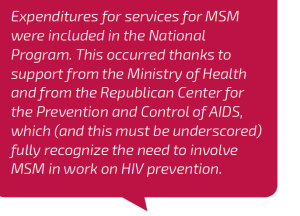
Results and/or Lessons
Expenditures for services for MSM were included in the National Program. This occurred thanks to support from the Ministry of Health and from the Republican Center for the Prevention and Control of AIDS, which (and this must be underscored) fully recognize the need to involve MSM in work on HIV prevention.
The Ministry of Health helped to provide a preferential rental rate for an office space for the organization “Vstrecha”, which was implementing a project under the Global Fund grant aimed at HIV prevention among MSM. Thanks to the participation of representatives of HIV-service organizations in the CCM and the Ministry of Health’s support for Global Fund policies, activities on HIV prevention among MSM were included in the Global Fund grant.
The organization “Vstrecha” provides services for MSM in 13 major cities in the country under the project “Expanding the coverage of HIV prevention programs among men who have sex with men (MSM)”. Activities are implemented by “Vstrecha” through a number of trusted medical and psychological specialists, as well as through outreach workers and volunteers from the MSM community [1].
The Association “Belarusian Anti-AIDS Network” participated in the development of a public contracts mechanism. The Association also drafted amendments and additions to the law “On the prevention of diseases that pose a threat to human health and of the Human Immunodeficiency Virus” on the introduction of a public contracts mechanism for HIV prevention.
According to LGBT activists, the main achievement was the establishment of a dialogue between non-governmental organizations, the Ministry of Health, and the Republican Center for the Prevention and Control of AIDS.
What Helped and What Hindered Activities
The Global Fund’s policies, according to which the CCM must document work on ensuring the participation of key populations (including, MSM and transgender people) in the development of requests for funding, contributed to the re-election of CCM members in 2014 and the inclusion of representatives of HIV-service organizations in the CCM.
For non-governmental organizations providing services to MSM, cooperation with the Ministry of Health of the Republic of Belarus and the Republican Center for the Prevention and Control of AIDS is very important, as they affirm at the national level the need for involving MSM in work on HIV prevention among LGBT people.
The main barrier for the activities of LGBT organizations is the institutionalization of homophobia, which does not receive the necessary evaluation and opposition from government authorities.
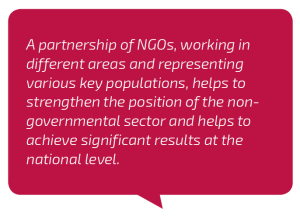
Benefits for Others
Non-governmental organizations from EECA countries can use the experience of holding an NGO forum for advocacy purposes and to form partnerships with the governments of their countries. At these forums, it is possible to organize a productive dialogue with government officials, at both the local and national levels, in order to popularize the work of NGOs, clarify the role of key populations (including MSM) in preventing HIV, and to advocate for the sustainability of services for key populations. In addition, forums are a convenient platform for dialogue between HIV-service organizations and LGBT activists. At forums, it is possible to hold consultations with representatives of the LGBT community to explain that the right to health is key to overcoming the HIV epidemic.
A partnership of NGOs, working in different areas and representing various key populations, helps to strengthen the position of the non-governmental sector and helps to achieve significant results at the national level.
More information about situation in other countries, you can find in our publication Successes of LGBT Involvement in National HIV Decision Making Processes.
Sources of Information
- National Report on Progress Achieved in the Implementation of the Global Response to AIDS (in accordance with the Implementation of the Political Declaration on HIV/AIDS): Republic of Belarus. // Reporting Period: January 2013–December 2014, – Minsk, 2015.
- Association of Equal Rights in cooperation with the Belarusian Helsinki Committee. A Half-Hour Before Spring. Report on Inequality and Discrimination in Belarus. – London, November 2013.
- LGBT Human Rights in Belarus. Presentation for the Universal Periodic Review. – Minsk: Human Rights LGBT Project “Gay Belarus”, 2014.
- Guidelines and Requirements for Country Coordinating Mechanisms; www.theglobalfund.org/en/operational/.
- Interview with Oleg Eryomin, Chairman of the Coordinating Committee of the Association “Belarusian Anti-AIDS Network”.



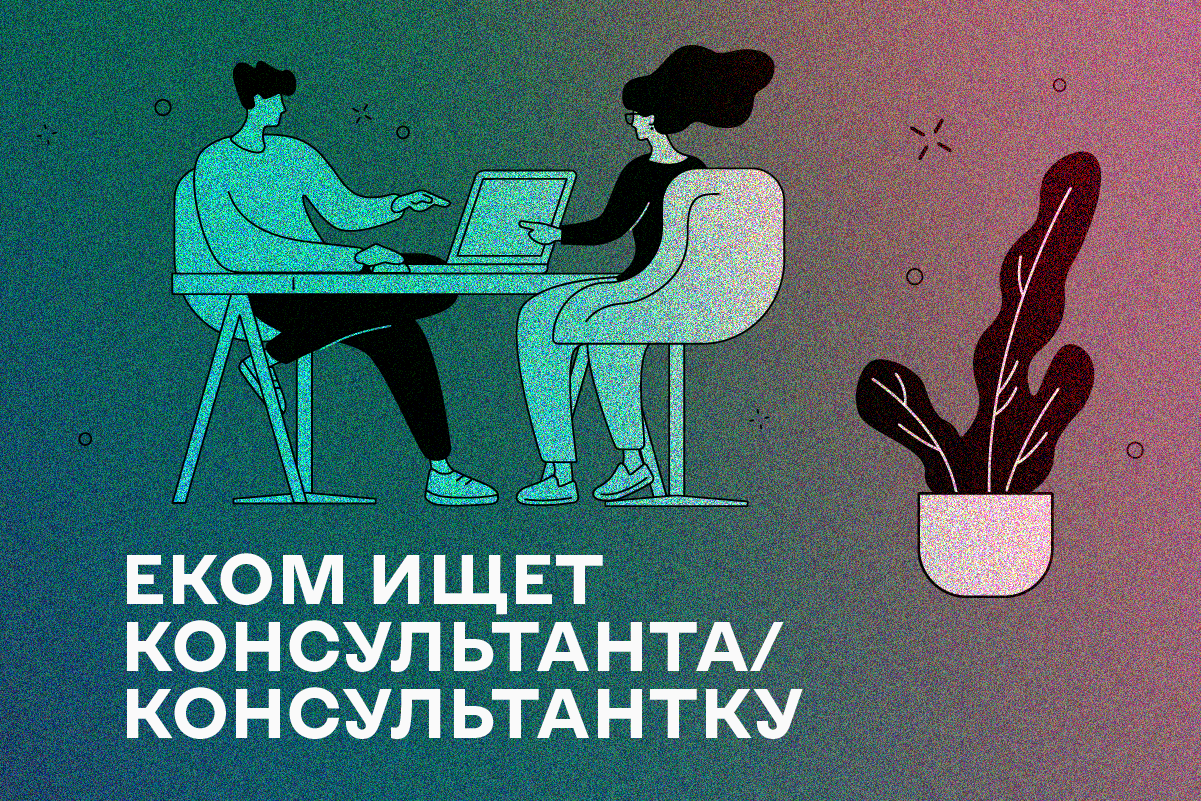
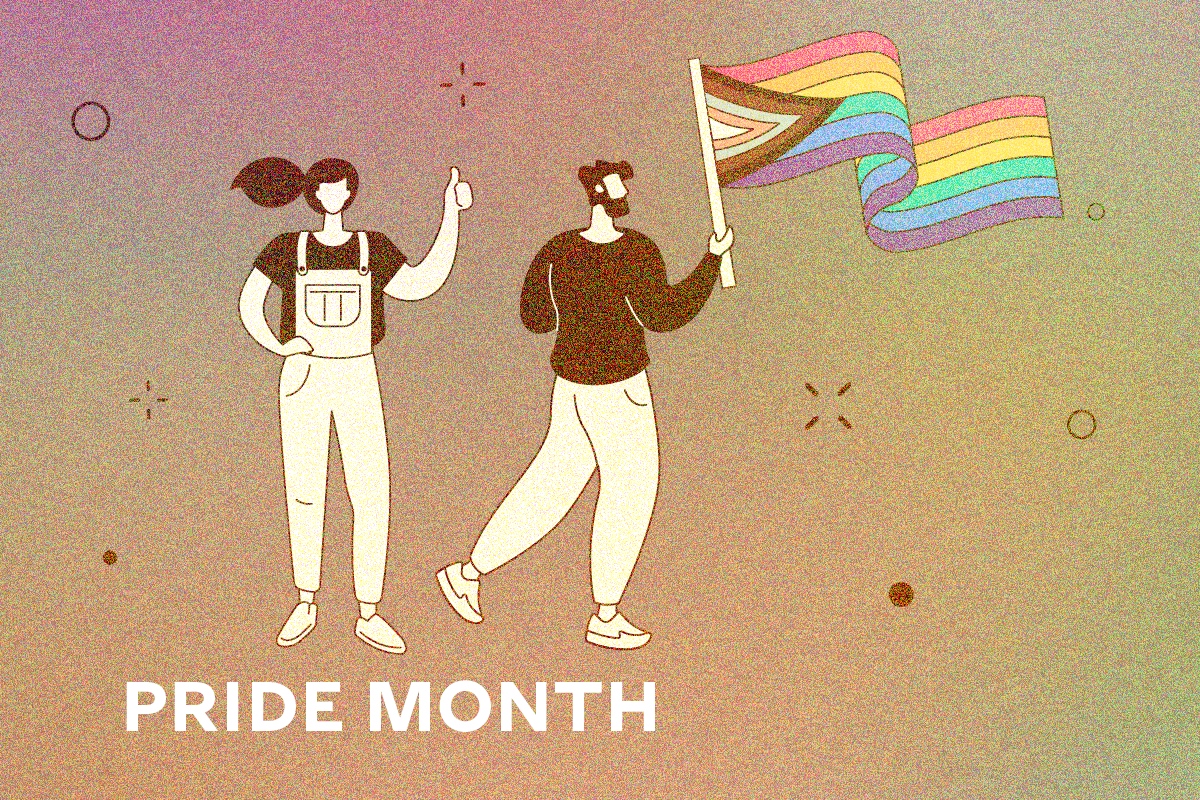
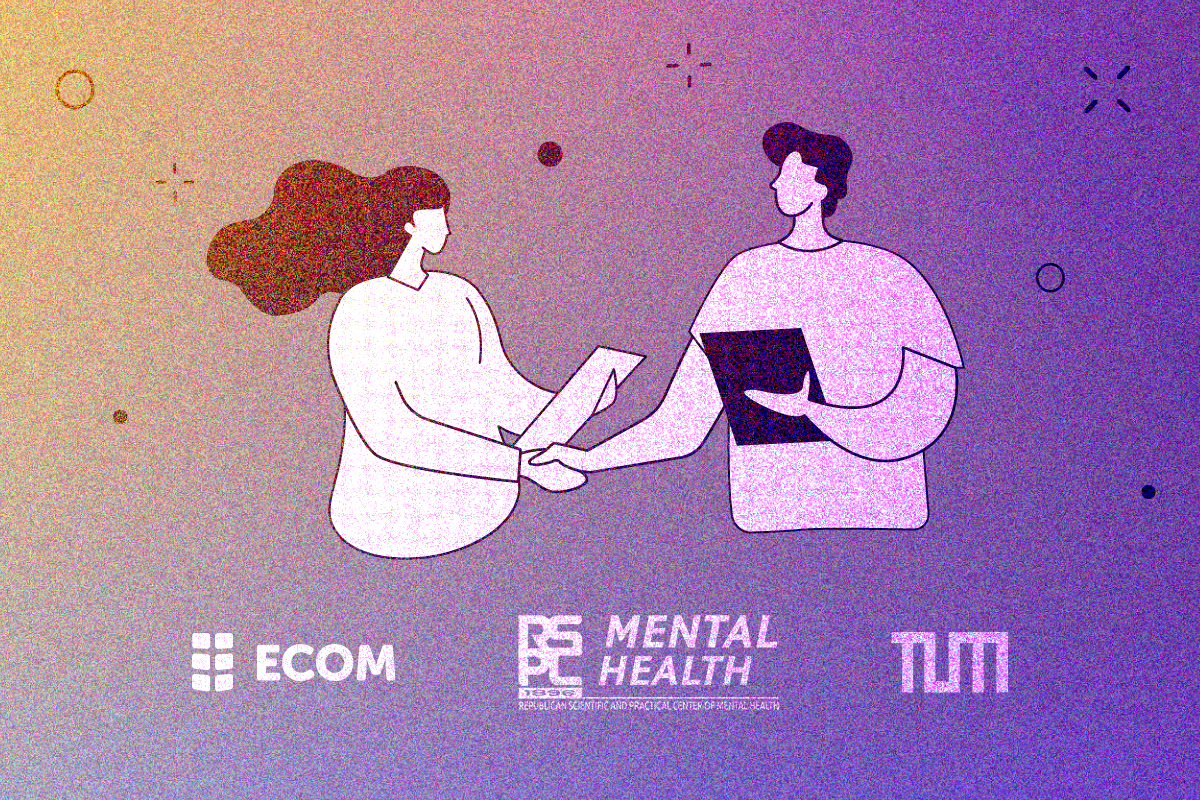
Комментарии
Пока никто не оставил комментарий